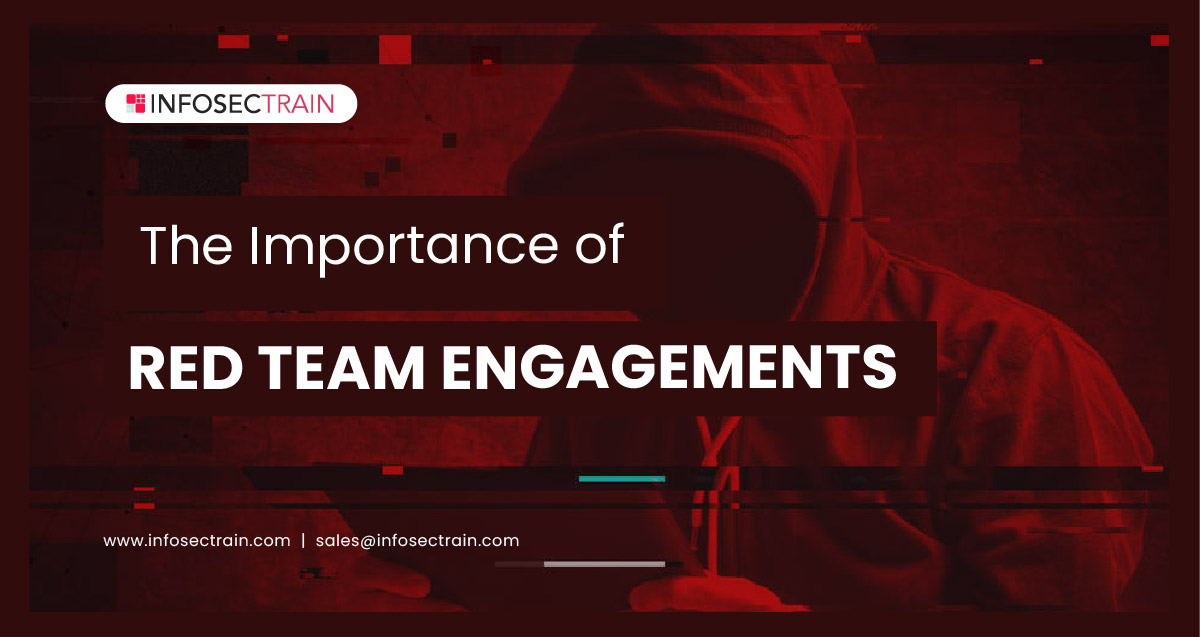The Importance of Red Team Engagements
The Red Team is a separate entity from the rest of the company. Red Teams are a group of threat actors whose activities are encapsulated within an individual exercise and operations. They are only hired when organizations are willing to check for any vulnerabilities in their systems or networks. The primary goal of the Red Team is to advise Blue Team members on how to safeguard data, networks, and systems against harmful activity.

Table of Contents
What is “Red Team Engagement”?
Benefits of Red Team Engagement
Red team members are hired in a variety of ways by different organizations. Occasionally, businesses will hire a group of ethical hackers. They sometimes employ a single person in charge of attacking the systems; the Red Team member must-do activities like vulnerability assessment and penetration testing on occasions.
What is “Red Team Engagement”?
Red Team Engagements are a great way to show a real-world threat posed by an APT (Advanced Persistent Threat). The assessors are told to compromise specified assets, or “flags,” by employing techniques used by a malicious hacker in an actual attack. These in-depth, complicated security audits are best suited for businesses striving to improve their security operations.
Performing security assessments such as penetration tests should be an integral part of your enterprise’s information security strategy to mitigate the risk of breaches. However, the best way to assess your organization’s preparedness to deal with an organized hacking attempt is through a red team operation, a full-scale simulation of a cyber-attack designed to test its ability to detect and respond to it rigorously.
Here are a few benefits of red team engagement.
Benefits of Red Team Engagement
Identifying your strength
It is misunderstood that the red team or offensive security assessments mainly focus on the organization’s weaknesses. But no, red team assessments also help us know the organization’s strengths. It is always essential and beneficial to have knowledge of your strengths and continue building and growing in those particular areas.
Test assumptions
Because they pay for them, businesses presume they have various security procedures. On the other hand, many providers sell “ransomware protection,” which organizations buy without testing. It’s all too tempting to believe that just because a security control has a budget, it must be working. It’s critical that your red team put those assumptions to the test.
Train blue teams
Defenders are essential to the organization, and they are the ones who identify any kind of attack, from phishing mail to viruses within the systems. To work out any kinks in your team’s response plan before an attack happens, provide technical training and review incident response plans and playbooks. It’s like a blue-team fire drill. And only with the red teams’ reports is it possible to give 100% training to the blue teams.
Understand the different approaches of an attacker
Unlike many regular security assessments, which are limited in scope and duration, red teaming aims to more effectively re-create an attacker’s strategy by testing your defenses secretly for weeks or months without previous knowledge of the target environment.
A red team operation starts with a thorough reconnaissance phase to learn everything there is to know about the target network and the security measures and technology in place. After the mapping is complete, the hacker will look for flaws and, if necessary, create bespoke tools to exploit them.
An ethical hacker will establish several command and control channels after successfully gaining access to a network to escalate privileges and enable lateral movement through the target network.
A red team engagement guarantees that defensive abilities are stretched to the utmost by attempting to achieve its final goal without being detected.
Get help addressing fundamental exposures
Red teaming is developed to cause no or little disruption to business operations by following a set of pre-defined rules of engagement. Each engagement identifies and quantifies significant security concerns and hazards so that they’ll be addressed before a catastrophic cyber breach occurs.
Regular, hand-written reporting is part of every red team operation, notifying critical stakeholders of the weaknesses discovered, the methodologies employed, and the information compromised. A debriefing that delivers actionable intelligence and thorough remedy guidance and tips to improve employee cyber awareness is included in all engagements.
Improve response
As your company conducts more Red Team engagements, response time will improve. Detections can now be measured in minutes by organizations. Annually, the ability to improve detections and then replay attack chains significantly reduces reaction time when compared to manual detection.
Final words
InfosecTrain is one of the best globally identified training platforms, concentrating on Information security services and IT security training. Enroll in our Red Team training course to participate in the practical sessions and exceptional training from the best trainers.







 1800-843-7890 (India)
1800-843-7890 (India)